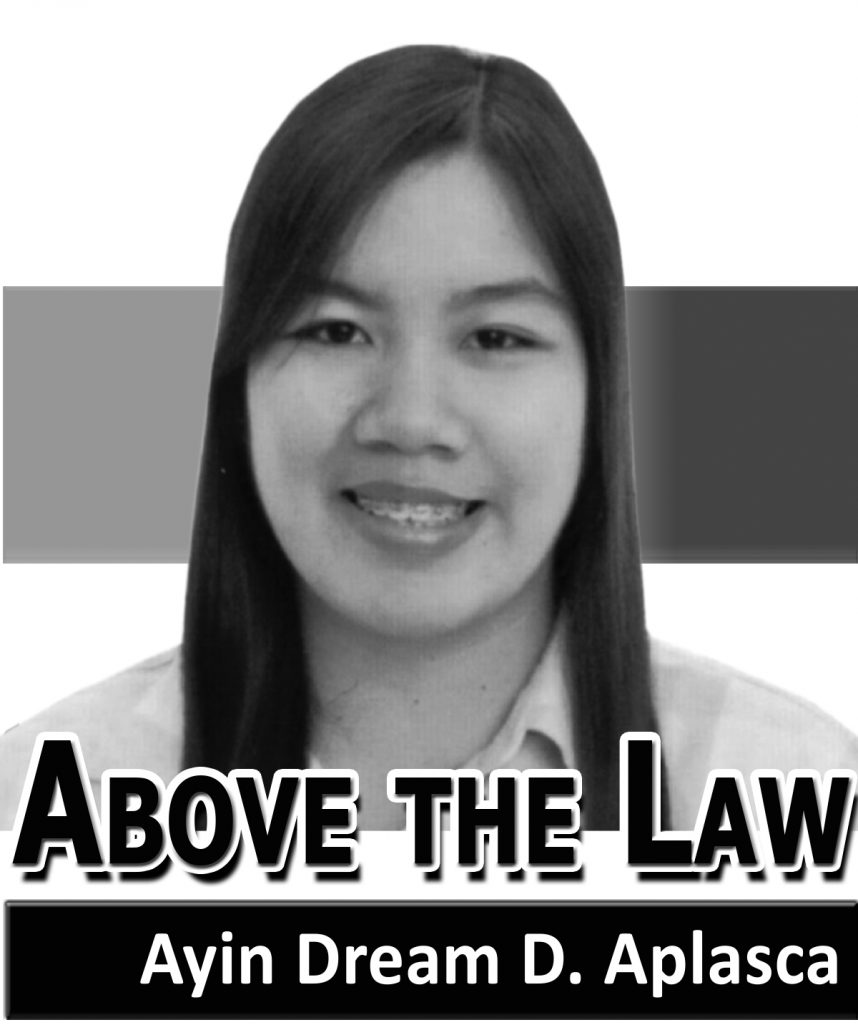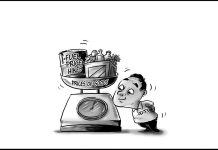
[av_one_full first min_height=” vertical_alignment=” space=” custom_margin=” margin=’0px’ padding=’0px’ border=” border_color=” radius=’0px’ background_color=” src=” background_position=’top left’ background_repeat=’no-repeat’ animation=”]
[av_heading heading=’ABOVE THE LAW ‘ tag=’h3′ style=’blockquote modern-quote’ size=” subheading_active=’subheading_below’ subheading_size=’15’ padding=’10’ color=” custom_font=”]
BY AYIN DREAM D. APLASCA
[/av_heading]
[av_textblock size=” font_color=” color=”]
Friday, August 18, 2017
[/av_textblock]
[av_textblock size=’18’ font_color=” color=”]
 I WAS READING a newspaper when I came across the Latin phrase “Dura lex, sed lex.”
I WAS READING a newspaper when I came across the Latin phrase “Dura lex, sed lex.”
No, it wasn’t my first time to encounter this phrase. I am familiar with these words since I was in high school. It means “the law is harsh but it is the law.” It excuses no one, and those breaching it should be held liable or pay the penalties.
The writer associated this Latin phrase on the nationwide smoking ban. In my case, I am associating this to the Uber and Grab issues.
In Iloilo City, we have taxis powered by the Grab mobile application. We can book taxis in just one click in our mobile phones. But even if we don’t have a mobile application we can still easily take a taxi ride by just waiting in loading and unloading areas. Or wherever we want. This is not the case in Manila.
In the big metro, Uber and Grab are a big yes-yes. I guarantee this because during the time I took the Bar examinations, these two transportation network vehicles (TNVs) saved my life travelling from UP Diliman to UST España as early as 4:30 a.m. No joke.
To those who tried these two, especially when they fly to Manila, let us admit it: both are very useful. Of course, the issues raised against them are true and correct. Both have violated a government regulation particularly accepting new drivers despite the suspension order from the Land Transportation Franchising and Regulatory Board (LTFRB).
As what I have mentioned in the first paragraph, “Dura lex sed lex.” The law is harsh but it is the law and we should follow it. Yes, and we can’t take the law into our own hands and decide which laws and regulations to encroach upon and to follow.
On the other hand, we cannot also deny that the government is a little bit unreasonable. I know it is a bit tactless when I say that the government couldn’t care less. The government has other options than suspend the TNVs, especially Uber. It should allow and regulate TNVs for the greater good because we can’t deny the fact that hundreds of Filipinos will be affected.
Prohibition, postponement of applications, and failure to process are not the solution because the Filipinos and the TNVs are mutually benefiting from each other. It should not be suspension but rather penalize using fine. It is a win-win situation; the government will earn and at the same time the commuters can still use the application while on changeover.
I hope the laws and regulations regarding this will adjust to fit the changing needs of the people. TNVs are one of the available resources that could answer the transportation needs of people. They will serve the public interest more.
The call is on the Department of Transportation, LTFRB and Congress to draft laws and regulations, orders,and legislation that will serve the public concern more.
I hope there will be less restrictions on TNVs to unbridle the possible benefits of ride-sharing and car-pooling. The government should give more attention to laws and regulations needed to keep commuters and roads safe.
In this fight, the Filipino commuters are at the losing end. Sad. But that is the truth. Again, dura lex sed lex.
(Atty. Ayin Dream D. Aplasca practices her profession in Iloilo City. She may be reached thru ayindream.aplasca@gmail.com/PN)
[/av_textblock]
[/av_one_full]







